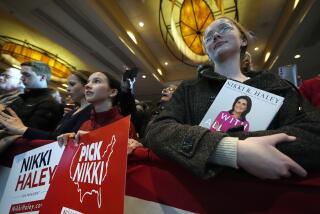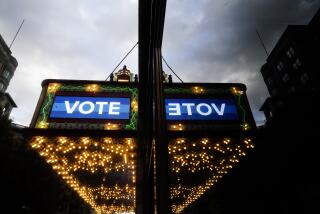Bush Must Bring Back Pat--and All His Flock
- Share via
WASHINGTON — Michigan and Illinois Republicans certified it. About 25% of GOP voters are disgruntled. Sufficiently so that they’ll cast a vote for Patrick J. Buchanan--even when his campaign is stumbling badly.
Twenty-five percent is Pat’s floor, and the Bush-Quayle campaign can breathe a sigh of relief that he couldn’t rise above it Tuesday. But pangs of anxiety should follow that long exhalation. George Bush is wining all the delegates to the convention--but he has yet to win the unqualified allegiance of his party.
As many as half of Buchanan’s supporters say they will vote for the Democrat this fall. That translates into a possible loss of 10% to 12% of Republicans. Many are the Democratic and Independent swing voters who became Republicans in the 1980s. The potential in the 1990s is for them to become GOP swing-voters.
Buchanan now promises kinder, gentler rhetoric. But a toned-down Buchanan won’t necessarily bring the drifting Republicans home. That is up to Bush.
The Bush campaign should recruit Buchanan by giving him a spot on the convention agenda, making him a surrogate in the fall and adding some his people to the Bush-Quayle campaign.
The President has to to go back to the future. His statement last week, with its promises to “reinvent our schools, transform welfare and health care,” and “change America as we changed the world” is a step in the right direction.
Take young voters. Today’s high school seniors were in first grade when Bush became vice president. They know nothing but GOP Presidents. They are wondering what life will be like for them after four years of college. Will they be like the class of 1990, many of whom are still searching for entry-level jobs?
Or take the baby-boomers. When Bush became vice president, they were just beginning to enjoy their upwardly mobile, self-centered lifestyle. But now they’re married with kids. They’re planning beyond the next exotic vacation, saving for college and retirement.
The ‘80s were about coming back. The ‘90s are about what comes ahead. How do we get to where we want to be, and who will lead us? Voters ask this question against the backdrop of one of the greatest declines in faith in governmental institutions we’ve seen since the late ‘70s. Congress seems like a Scandal-of-the-Month Club.
What Bush needs to do is spell out how he will change America. Reinventing education is great. We spend more on education than defense. The President needs to tell us how we’ll get our money’s worth. He should tell those baby-boomers their kids will get an education that equals or exceeds what Japanese and German students get. Of academic mediocrity, he needs to say, “This will not stand.” The Education 2000 initiative was a fine start. But voters aren’t interested in what it accomplished--they’re interested in what Bush will do next.
Bush also can’t be defensive about international affairs. His strong card is still his proven leadership in foreign policy. But his weak suit has been linking America’s superpower status to better cities, neighborhoods and workplaces. He needs to articulate how the new world order benefits us. He can do it in two words: peace and prosperity.
The key is to concentrate on the 25% of Republicans who have been voting for Buchanan. It’s unrealistic to expect much movement before the primaries end. But it is realistic--and critical--for Bush to win over the Buchanan voters who say they’ll go to the Democrats. He can end the drift, shore up his base and get ready for the main contest with Bill Clinton by going back to the future.
More to Read
Get the L.A. Times Politics newsletter
Deeply reported insights into legislation, politics and policy from Sacramento, Washington and beyond. In your inbox twice per week.
You may occasionally receive promotional content from the Los Angeles Times.










